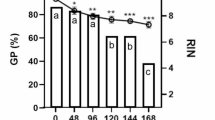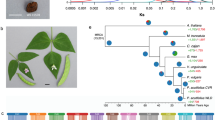Abstract
NEWHOOK1, using the technique of Baylis2, reported that a hot-water steep of 10 min. at 52.8° C. controlled seed-borne pasmo (Sphaerella linorum Wollenw.) in seed-lines of linen-flax (Linum usitatissimum L.). Watson et al. 3 have recently reported the use of carbon tetrachloride as a suitable material in place of water for heat treatment of peas and beans. It has been shown by them that germination of peas and beans was not affected by a 60-min. steep at 75° C. Heat transfer into the seeds was demonstrated, but very little carbon tetrachloride was absorbed.
This is a preview of subscription content, access via your institution
Access options
Subscribe to this journal
Receive 51 print issues and online access
$199.00 per year
only $3.90 per issue
Buy this article
- Purchase on SpringerLink
- Instant access to the full article PDF.
USD 39.95
Prices may be subject to local taxes which are calculated during checkout
Similar content being viewed by others
References
Newhook, F. J., N. Z. J. Sci. Tech., 24, 102A (1942).
Baylis, G. T. S., N. Z. J. Sci. Tech., 23, 1A (1941).
Watson, R. D., Coltrin, L., and Robinson, R., Plant Dis. Reporter, 35, 542 (1951).
Loughnane, J. B., McKay, R., and Lafferty, H. A., Sci. Proc. Roy. Dublin Soc., 24, 89 (1946).
Author information
Authors and Affiliations
Rights and permissions
About this article
Cite this article
CRUICKSHANK, I. Thermo-chemical Seed Treatment. Nature 173, 217–218 (1954). https://doi.org/10.1038/173217a0
Issue date:
DOI: https://doi.org/10.1038/173217a0



